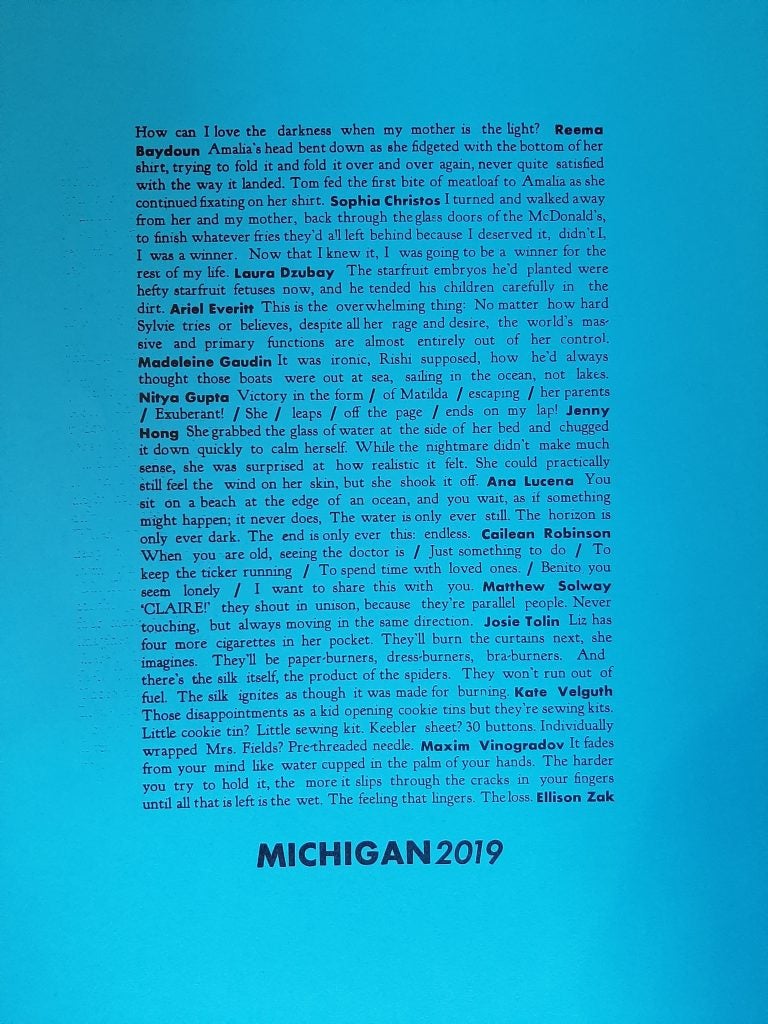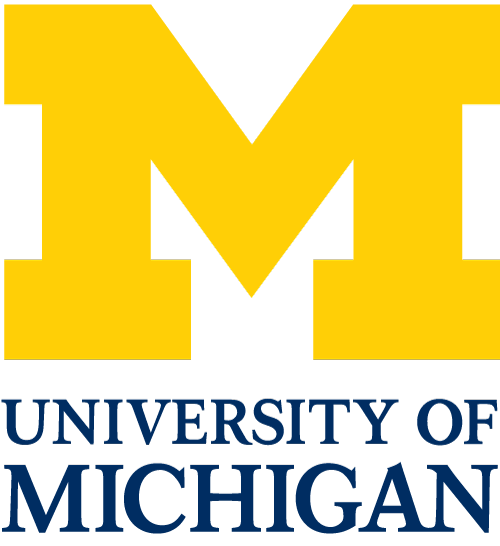
Academic writing at a university level can be a daunting task. Whether it’s forming a strong thesis statement, organizing evidence to support a claim, or learning proper MLA format, constructing an academic essay remains an integral part of a college curriculum. Writing pushes students to communicate and argue effectively, but also to develop their own voice. For students who aspire to write creatively, the University of Michigan’s English department is proud to offer the creative writing minor and the creative writing sub-concentration.
The minor is not be mistaken for the sub-concentration. A crucial difference is that the minor is available to undergraduate students studying outside of the English department, whereas the creative writing sub-concentration is a year-long program specific to English majors that requires a senior thesis. “If you are going to do English, you can take a lot of creative writing classes and just count them [towards the major] and that’s fine,” said Cody Walker, the Director of the Undergraduate Program in Creative Writing. “If [English majors] really want to take it to another level, you can apply to the creative writing sub-concentration.”
It was only less than a decade ago that the creative writing minor emerged in the English department. Walker, who has been running it for the past three years, revealed how the minor was “designed to be separate from the English major”. Students interested in the creative writing minor should begin with enrolling in English 223, a course that typically explores prose and poetry, as well as being a starting ground to practice one’s critiquing skills through in-class workshops. Once students have completed this prerequisite, they may declare the creative writing minor. Students can then advance to English 323/423 for fiction writing OR English 324/424 for poetry writing, and continue growing their writing portfolios. These 300-400 level courses, however, do involve submitting samples of the student’s work to the instructor to be granted approval into the course. An additional nine English credits — be it literature or language courses — also fall under the minor’s requirements.
Within the past year, the English department has introduced creative nonfiction as a third avenue for those pursuing or interested in the creative writing minor. “We don’t have a journalism major here at U of M, [but] a lot of people interested in longform journalism…come to us,” said Walker. Outside of journalism, creative nonfiction also includes memoir, art of the essay, and reviewing, to name a few.
The creative writing sub-concentration stretches further back to the ‘90s, according to Walker, who took over the directorship after Keith Taylor retired in 2018. “I loved the program, I was eager to raise my hand when it was time to find a new director,” said Walker.
English majors interested in the sub-concentration program are to apply in the winter semester of their junior year, after they’ve taken or are currently enrolled in English 323/324. The sub-concentration accepts a limited number of applicants every year, with applications being reviewed early on in the winter semester. A panel of three judges, of which Walker is a part, reviews each student’s submitted writing sample. “We’re looking for a couple of different things,” Walker divulged, when asked about the panel’s judging process. “Is this somebody [who’s] interested in language, who cares about words…about the way the words knock against each other?” Walker differentiated this from a story or poetry piece feeling “resolved” or “completed” in the judges’ eyes. “That’s great if that happens,” he said, “but I think more important is, does the writing feel alive?”
English majors accepted into the sub-concentration program first meet their cohort in April of their junior year to “lay down the groundwork” for their final undergraduate year. “The heavy lifting happens in the winter semester [of their senior year],” explained Walker. In the early weeks of program, however, Walker devotes much time establishing a tight-knit community among the cohort. “It’s just so obvious to me that a class goes well when everybody’s on board and everybody is supporting each other,” he said.
In the fall, the sub-concentration cohort meets weekly as a group and individually with a first reader — Walker — and bi-weekly with a second reader, who is a faculty member on UM’s campus. Second readers tend to hail from the English department, but as Walker said, “It could be anyone on campus who seems like they’d be a helpful reader.” From there, in January when English 428 begins, the cohort meets once a week for workshop on their thesis project. Theses end up being “close to book-length” as Walker described; for poetry students this means a range of 45 to 55 polished pages of work, while for fiction writers the range is kicked up to 70 to 100 pages, whether that is a novella or a compilation of short stories or anthologies.
The work and draft overhauls that go into creating a final thesis is where having a support network becomes a crucial component. Writing is a vulnerable process for many, though, and the aspect of sharing one’s work in a workshop can be intimidating, regardless of how green or well-practiced a student is with writing. “It’s up to the instructor to create a space where people are going to feel comfortable,” supplemented Walker, “and I know we have really wonderful faculty who prioritize that.” Walker has mostly taught poetry workshop courses with the occasional fiction workshop at Michigan, but the standard of students being respectful and civil towards each other firmly stands. In terms of establishing a community within the class — regardless of if it’s poetry, fiction, or the sub-concentration workshop — Walker warmly said, “It’s really not that hard to do.” Workshops aren’t the “Pollyannaish experience” of endless praise, as Walker put it, but he continued by saying, “Even if you’ve been through a round of criticism, people are essentially on your side. It’s in the service of wanting you to get to the place that you yourself want to get to as a writer, so we’re all in this together.”
At the end of the semester, the creative writing sub-concentration group has the opportunity to share their work publicly by doing readings at Ann Arbor’s Literati Bookstore. There are also readings at Angell Hall with the English Lit honors group. Creative writing minors are not to feel left out, however. In April, there is the Hopwood Reading to give the minors sense of community as well meet those in the cohort.
Additionally, since becoming director of the sub-concentration program, Walker has began a partnership with Ann Arbor’s Wolverine Press to create broadside posters, where students of the cohort compile their work into one piece. This year the process has been expanded, as the cohort will actually go to Wolverine Press and do the ink-work themselves. “The more we can make connections with folks outside of Angell Hall, the better,” Walker said.
As of 2020, the deadline for English juniors to apply to the creative writing sub-concentration is Friday, February 7th. Students further interested in this program or who have questions about the creative-writing minor may contact Cody Walker.

Wolverine Press’s broadside poster in association with the 2019 creative writing cohort.

